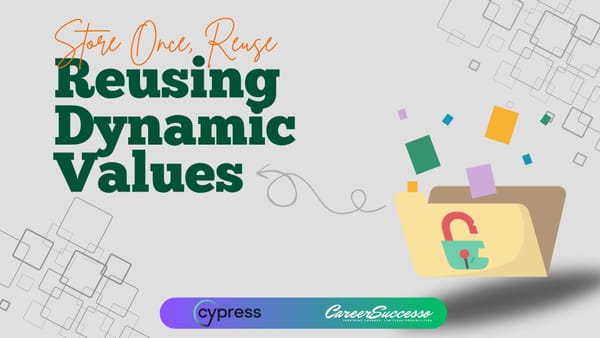Automating AWS Lambda Function Invocations in Cypress Using AWS SDK v3

In modern application development, invoking AWS Lambda functions is essential for various back-end tasks, from simple requests to complex data processing. While tools like Cypress are widely used for front-end testing, it can also be extended to test the integration of back-end services like AWS Lambda.
In this article, I’ll walk through the steps for configuring AWS Lambda invocation in Cypress using AWS SDK v3 and Cognito Identity Pool for authentication.
Why AWS Lambda and Cypress?
AWS Lambda enables you to execute backend logic without provisioning servers, making it a perfect candidate for microservices and scalable back-end architecture. Testing Lambda functions using Cypress ensures your front-end interactions trigger expected behaviors on the back end, providing end-to-end test coverage.
Setting Up AWS Lambda Invocation in Cypress
1. AWS SDK v3 Setup with Cognito Identity Pool
For secure communication with AWS Lambda, we’ll use AWS SDK v3 and authenticate through AWS Cognito Identity Pool, which provides temporary credentials for secure access.
//support/commands.ts
import { LambdaClient, InvokeCommand } from "@aws-sdk/client-lambda";
import { fromCognitoIdentityPool } from "@aws-sdk/credential-provider-cognito-identity";
// Configure AWS SDK v3 to use credentials from the Cognito Identity Pool
const lambdaClient = new LambdaClient({
region: 'your-region', // Replace with your AWS region
credentials: fromCognitoIdentityPool({
identityPoolId: 'your-identity-pool-id', // Replace with your Cognito Identity Pool ID
clientConfig: { region: 'your-region' },
}),
});
This code snippet configures the `LambdaClient` with the appropriate AWS region and Cognito credentials. Using `fromCognitoIdentityPool`, temporary credentials are retrieved dynamically, enhancing security when interacting with Lambda functions.
2. Custom Cypress Command to Invoke AWS Lambda
I extend Cypress with a custom command to invoke AWS Lambda. This command can then be used across multiple test cases, providing reusable logic for Lambda invocations.
//support/commands.ts
declare global {
namespace Cypress {
interface Chainable {
invokeLambda(functionName: string, payload: any): Chainable<any>;
}
}
}
Cypress.Commands.add('invokeLambda', (functionName: string, payload: any) => {
const command = new InvokeCommand({
FunctionName: functionName,
Payload: Buffer.from(JSON.stringify(payload)),
});
return new Cypress.Promise((resolve, reject) => {
lambdaClient.send(command)
.then((data) => {
if (data.Payload) {
resolve(JSON.parse(Buffer.from(data.Payload).toString()));
} else {
reject(new Error('No payload returned from Lambda'));
}
})
.catch((err) => {
reject(err);
});
});
});
In this command, the Lambda function is invoked using the `InvokeCommand` method of AWS SDK v3, with a custom payload. If the function returns a payload, it is parsed and resolved as a Cypress promise, making it easy to assert results in the test.
3. Writing the Cypress Test
With the custom command in place, invoking a Lambda function in your tests becomes straightforward. Below is an example test that sends a payload to a Lambda function and checks the response:
//e2e/lambda.spec.ts
describe('AWS Lambda Invocation', () => {
it('Should invoke AWS Lambda function successfully', () => {
const payload = {
value: 'Hello, World!',
}; // Define your Lambda payload here
cy.invokeLambda('your-lambda-function-arn', payload)
.then((response) => {
expect(response).to.have.property('statusCode', 200); // Assert that the Lambda function executed successfully
})
.catch((err) => {
throw err;
});
});
});
This test uses the `invokeLambda` command to send a payload to the AWS Lambda function. The response is logged and validated to ensure the function executed as expected. In case of any errors, they are captured and logged for troubleshooting.
4. Managing Sensitive Data
To secure sensitive information like Lambda ARNs, region, and credentials, store these values in environment variables. This keeps your test configurations secure and flexible.
//cypress.env.json
{
"lambdaFunctionArn": "your-lambda-function-arn",
"region": "your-region",
"identityPoolId": "your-identity-pool-id"
}By using environment variables, you ensure that sensitive data is not hardcoded into your test scripts, following best practices for security and maintainability.
5. Conclusion
Integrating AWS Lambda invocation with Cypress using AWS SDK v3 is a powerful approach to extend your end-to-end testing strategy. This method allows you to validate not just the front-end interactions but also the back-end processes that are triggered by your UI. By including Lambda function tests in your Cypress test suite, you can enhance your test coverage and confidence in your serverless architecture.
This approach is particularly beneficial for teams relying on serverless technologies or microservices, where Lambda functions are a critical part of the workflow.





